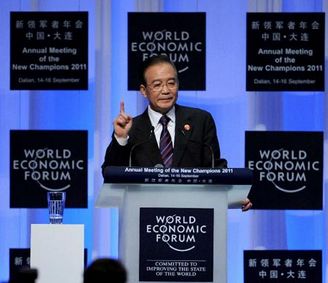Promote sound, sustainable and quality development
 0 Comment(s)
0 Comment(s) Print
Print E-mail
China Daily, September 15, 2011
E-mail
China Daily, September 15, 2011
|
|
|
Premier Wen Jiabao |
The following is the full text of the keynote speech made by Premier Wen Jiabao at the opening of the World Economic Forum's Annual Meeting of the New Champions 2011 held Sept 14-16 in the city of Dalian in Northeast China's Liaoning Province:
Professor Klaus Schwab, Executive Chairman of the World Economic Forum, Ladies and Gentleman,
I wish to extend warm congratulations on the opening of the fifth Annual Meeting of the New Champions, or the Summer Davos, and a sincere welcome to you all. The Summer Davos has undergone five years of growth and established its principle of being oriented to the whole world, to the future, to innovation and to youth. Participants have had lively and dynamic exchanges at various forms of discussions, delivering to the world messages of hope, confidence and courage, particularly at the difficult times of the global financial crisis. The theme of this year's meeting Mastering Quality Growth represents people's shared desire for robust, sustainable and balanced economic growth, and I wish the meeting a great success.
Three years have passed since the outbreak of the international financial crisis. International organizations, governments, the business communities and academia are all taking a hard look at the root causes of the crisis and exploring ways to sustain the growth of both the global economy and national economies. With regard to China's economic development, some people have hailed its achievements, while others have expressed doubt. Some are optimistic about China's economic future, while some say that China is in trouble. But we in China remain clear-headed and are firm in our confidence.
The first decade of this century has seen major changes in the global political and economic landscape. It has also seen rapid industrialization and urbanization in China. Great progress has been made in China's comprehensive reform, opening-up and modernization endeavor during this decade.
Over the last decade, China's economy has been growing by 10.5 percent annually. Its GDP and trade volume respectively rose from the sixth and seventh place to the second in the world. China's industrial structure is being upgraded; the foundation of its agriculture has grown stronger; development in the central and western provinces has picked up speed; and a mode of regional development with each region tapping its distinctive strength has taken shape. Social services are thriving; and urban and rural incomes have risen substantially. China has taken on a completely new look as its total economic output and overall national strength significantly increased and people's living standards greatly improved.
We have continued to resolve challenging issues in development by carrying out reform and steadily improved the socialist market economy. An array of important reform measures have been introduced in taxation, finance, enterprises, rural areas and resource prices. They have enhanced the vitality of the micro-economy and macro-regulation and raised the efficiency of market allocation of resources. We have made full progress in expanding social services. Free nine-year compulsory education has been achieved nationwide. A basic social security system covering both urban and rural areas has been put in place. Construction of government-subsidized housing is being accelerated. The cherished goal of the Chinese people that everyone has access to education, employment and pay, medical and old-age care and housing is becoming a reality. We are removing bottlenecks hampering development and have released the initiative, enthusiasm and entrepreneurial spirit of the Chinese people. This, in turn, has fully activated factors such as labor, capital, knowledge, technology and management, which form the source of rapidly increasing social wealth.
We are pursuing a win-win strategy of opening-up to increase the openness of China's economy. Since joining the WTO in 2001, we have speeded up efforts to change the way of conducting foreign trade, improved the import and export mix, upgraded the processing trade and vigorously developed trade in services. We have pursued the dual strategy of introducing foreign capital and encouraging Chinese companies to invest overseas to achieve greater balance between the use of FDI and overseas Chinese investment. We have taken an active part in the reform of the global economic governance structure and the building of regional cooperation mechanisms, and worked to deepen bilateral and multilateral economic and trade relations. China today is a fully open market economy.
With its development entering a new stage, China is in a period of strategic opportunities. Peace, development and cooperation remain the trend of our times. The international environment is generally conducive to China's pursuit of peaceful development. Numerous factors continuous industrialization, urbanization and agricultural modernization, huge market potential, a relatively high savings rate, better R&D capacity, better education, a more skilled labor force, deepening reform and overall stability have created conditions and vast space for continued economic and social development. On the other hand, we are still facing a pressing problem, that is, development is not yet balanced, coordinated and sustainable, and there are many institutional constraints hindering scientific development. As the size of our economy grows, it will be difficult to keep high growth rate over a long period of time. However, the new developments, both internationally and in China, have not changed the fundamentals of China's development. We have the right conditions, and both the ability and confidence to maintain steady and fairly fast growth of the economy.







Go to Forum >>0 Comment(s)